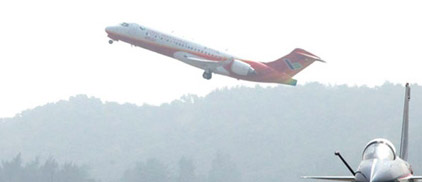Top News
China ready to challenge Airbus, Boeing
Updated: 2011-01-07 11:01
By Wang Zhuoqiong (China Daily European Weekly)
"It is impossible for COMAC to be a real challenge to Airbus or Boeing now. Even in the domestic market, it will take a long time for COMAC to rival the two companies. But if they continue to make rapid strides, things will change in the future," says Cao.
"China's homemade airplanes can be a good option in the lower-end airplane market where the two established players will find the profits too thin to be worthy of production."
"The future of aviation manufacturing will be divided in such a way that Airbus and Boeing focus on high-end and larger airplanes and manufacturers in emerging countries such as China, Brazil and Russia can deal with the narrow-body or regional airplanes," says Li Xiaojin, professor at the Civil Aviation University of China.
"China's foray into the larger passenger jet market could be a 'win-win' for the Chinese and for US aviation firms," Joe Tymczyszyn, executive director of the US-China Aviation Cooperation Program, which comprises aviation companies and government organizations, told USA Today in a recent interview.
|
 An ARJ21-700 jet takes off in Zhuhai, Guangdong province. Xinhua
|
"The success of COMAC will depend on how far the company's technological capabilities can be adopted by global technology leaders."
Wu Guanghui, COMAC's chief designer and deputy general manager, says the company will give priority to suppliers that set up joint ventures with Chinese partners. The company has about 17 global suppliers and has also set up 14 joint ventures.
AVIC, the primary supplier of subsystems to COMAC, has played a major role. In June 2007, AVIC established a Tianjin-based joint venture with Airbus to undertake the final assembly of the European company's A320 planes.
Last year, AVIC and Airbus formed another joint venture to produce composite material parts for the A350; two with Goodrich, one for landing gear and the other for nacelle (engine compartment) components; one with Nexcelle - itself a joint venture between GE and France's Safram - to manufacture engine nacelles and components; and one with GE to develop and bid on avionics projects for C919.
Other corporations that have set up joint ventures in China to win agreements to supply COMAC include Honeywell, for auxiliary power units, and Parker Hannifin, for fuel and hydraulic systems.
For now, most of the Chinese aviation firms prefer to play a wait and watch approach. Companies like Huawei Technologies had to wait for several years before they could take on global giants like Cisco Systems. So also has been the case of the high-speed train industry.
Honeywell's president and CEO for China and India, Shane Tedjarati, considers China's entry good news for the aviation industry. "China is the only other continental economy with a national will, the muscle and the capacity and all the other ingredients that are needed to create what happened in Europe and the United States 30 years ago."
"We are developing products that would serve not only the Chinese market but also the markets that the Chinese would provide globally. It is similar to what we do with Airbus and Boeing," says Tedjarati.
E-paper

Ear We Go
China and the world set to embrace the merciful, peaceful year of rabbit
Preview of the coming issue
Carrefour finds the going tough in China
Maid to Order
Specials

Mysteries written in blood
Historical records and Caucasian features of locals suggest link with Roman Empire.

Winning Charm
Coastal Yantai banks on little things that matter to grow

New rules to hit property market
The State Council launched a new round of measures to rein in property prices.
